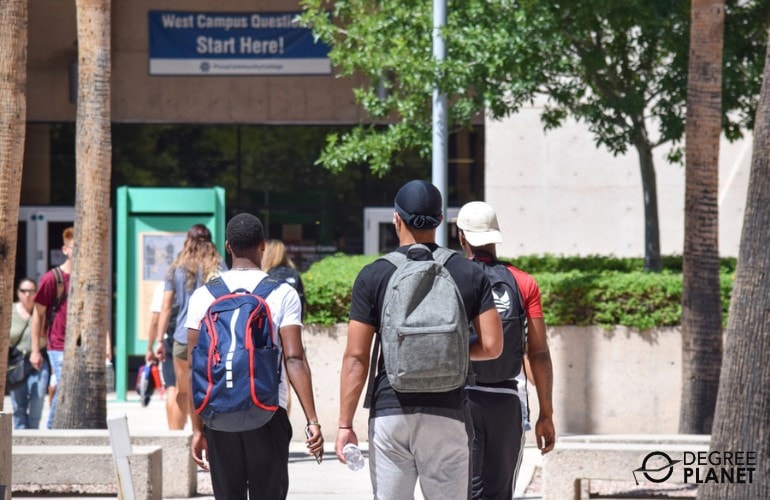If the university experience hasn’t been quite what you expected, you may be considering dropping out of college and going to community college. For some students, that can be an advantageous move.

At a community college, you may be able to save money, find your footing, and work toward a degree that may lead to a promising career.
Editorial Listing ShortCode:
Switching to a community college might be a beneficial way to turn your educational journey around.
Is Transferring to Community College a Good Idea for 4 Year University Students?

You may have found that a 4 year college is not the best fit for you, at least not right now. Instead of trying to fight this feeling for the next several years, you might consider switching to a community college.
Your challenges at a traditional college might include any of the following:
- Academic struggles
- Career uncertainty
- Inability to afford tuition
- Need for greater flexibility
You may have found that your original plan for your major isn’t a good fit. At a community college, you could get your general education classes out of the way while exploring what path to take.
Editorial Listing ShortCode:
Some community colleges offer hands-on experiences that may help you learn what career path interests you. Also, a school’s partnerships with local businesses may give you valuable connections in the job market.
Other benefits of attending a community college may include:
- Smaller class sizes. Community colleges often have smaller class sizes than large universities. This may make it easier to get personalized attention and extra help.
- Manageable course load. At a community college, you may not feel as pressured to take a full course load. Enrolling in just 2 or 3 classes at a time may seem more manageable.
- Overall cost. Cost is one of the biggest reasons that some people make the switch. The price of community college is usually quite a bit lower than that of 4 year schools.
- Flexible class schedules. Community colleges often prioritize flexibility. Evening or weekend classes as well as online studies are made for fitting into your life.
Attending a community college, even for a portion of your education, might be a way to turn your academic journey around. Colleges also don’t discriminate against age, so community college is a perfect opportunity for those who want to go back to college at 35 or older.
Why Community College Is a Smart Investment for Many Students

A traditional college experience can cost tens of thousands of dollars. Students often graduate with debt that can be hard to pay off with a starting salary.
Community college offers a promising alternative. For in-district students, the per credit hour cost is usually fairly reasonable. Plus, if you live at home and commute to campus or take online classes, you might be able to save on room and board as well.
Although you might pay less for classes at a 2 year college, that doesn’t mean you won’t be getting as much for your money. You may take similar classes to those you’d take at a 4 year college. Smaller class sizes might even help you get more out of your courses.

Later on, your community college credits may transfer back to a 4 year school. This is especially true if you complete an associate degree before returning to a traditional university. You could be halfway to a bachelors without having spent nearly as much money.
Even if you no longer have your sights set on a bachelor’s degree, community college may still be a good investment. You can generally make more money with an associate degree than with no college degree at all.
There are also some fields with high salary potential for those with an associate degree. For example, there are healthcare, engineering, and technology jobs that offer dependable salaries to community college graduates.
How to Transfer to a Community College After Dropping Out of a 4 Year University

You may be wondering, “Is community college hard to get into?” Many community colleges actually offer open admissions policies so that nearly any applicant can find a place at the school.
Although each school has its own admissions process, here’s a general overview of how to get into community college:
- Fill out an application.
- Talk to an admissions counselor about transferring credits.
- Take placement tests.
If you’ve already completed some undergraduate courses, you may want to look into transferring your credits so you do not need to repeat courses at your new school.
Editorial Listing ShortCode:
Transfer policies vary from one community college to the next. As a general rule, though, you can probably get credit for each passed class that was taken at a regionally accredited college.
For classes that serve as a prerequisite for more advanced courses, you may need to have achieved a minimum grade for the community college to accept your prior work.
Speaking to an admissions counselor at your new school may be quite helpful. The counselor may explain the transfer policy, explain what credit you’ll receive, let you know whether past credits will factor into your GPA, and provide advice about your next steps.
Financial Aid and Scholarships for Community College Students

Community college is usually less expensive than traditional 4 year schools, but don’t let that deter you from seeking financial aid. Financial assistance is available for 2 year schools just like it is for 4 year universities.
You may start by filling out the Free Application for Federal Student Aid (FAFSA). This document will help determine your eligibility for government grants and loans. If you qualify, you might receive both state and federal help.
Scholarships can be another important source of assistance. Some scholarship programs specifically target community college students.
If you currently have a financial aid package, it probably won’t directly transfer over to your new school. Rather, there may be a change in the benefits that you receive. The college’s financial aid department may be able to help you sort that out.
Can I Drop Out of College and Go to Community College Instead?

If the college experience isn’t working out well for you so far, you might be wondering, “Should I go to community college instead?”
It’s possible that community college may be a better fit, depending on your situation. Two year schools often have the advantage of smaller classes in which you might feel more comfortable and get more personalized attention.
At a community college, you might get hands-on experiences that you wouldn’t have at a larger university. Those experiences may help you figure out what you want to do with your life, or they may help you affirm a career path you’ve already chosen.
In addition, community college classes often cost less and may be offered at more convenient hours.

If you decide to drop out of college and go to a community college, you may always choose to go back to a four year university down the road. Courses and even an associate’s degree completed at an accredited community college can often transfer back into a 4 year school.
Will My College Credits Still Be Counted?
Yes, you may be able to transfer your accredited college credits to your new school. This may save you money and help you finish an associate degree in less time.
Credits usually have to be from an accredited college in order to be transferred. Some colleges may also set a minimum grade requirement for transfer credits. Transfer policies vary among institutions. You may want to speak with an admissions counselor at your new school to learn more about your options.
Should I Transfer to Community College from a 4 Year University If My Grades Are Bad?
Switching to a community college may be a strategic move if you’re struggling academically, but it’s not your only option.
Editorial Listing ShortCode:
Before changing colleges, you may want to ask your current school about getting extra help. Your university might offer tutoring or other academic supports. Community college classes may still be challenging. Even still, the smaller class sizes and the possibility of a smaller course load may help along in your academic pursuits.
For students who get academically dismissed, consider looking into community colleges that accept academically dismissed students.
How Hard Is Community College?

It’s common for incoming students to wonder, “How hard is community college?” The answer to that question will depend on a variety of factors, such as the type of student you are, your preferred learning styles, and how the classes are structured.
Although you shouldn’t expect to breeze through community college courses, there may be some systems in place to help you succeed better than you would at a 4 year school.
Community colleges often have remedial classes to bridge the gap between where you are and where you want to be. They may also offer placement tests, small class sizes, tutoring, and other academic supports.
Should I Go to Community College?

If a 4 year university doesn’t seem to be the right fit for you, then enrolling at a community college may be a beneficial option for you to consider. At a 2 year school, you may explore your interests, receive academic assistance, benefit from flexible scheduling, and save money over the cost of a 4 year degree.
At the end of your studies, you may graduate with an associate degree or a professional certificate. These credentials may help you start a dependable career or advance to further studies at a 4 year institution. Your time at an accredited community college may be the first step to a promising future.

